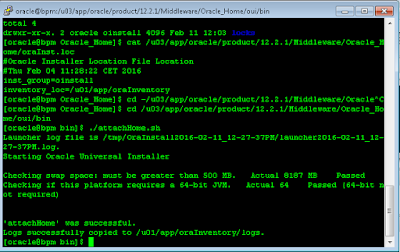I recently installed Oracle® Linux 7.2 on my VirtualBox 5.0.14 installation on Windows 7 in order to have a private playground for evaluating software. Afterwards I installed Oracle® 12c database version 12.1.0.2 on my new virtual Linux server. This went fine until I fired up Database Configuration Assistant (DBCA) in order to create a playground database. DBCA just hanged forever without consuming noticeable CPU. I kept it running for an entire night, but it never started fully up. It kept hanging at the splash screen as shown below:
Investigations
The log file $ORACLE_BASE/cfgtoollogs/dbca/trace.log_OraDB12Home1_<timestamp> showed the following:
[main] [ 2016-02-04 10:06:33.737 CET ] [Host.<init>:1090] Begin tracing..
[main] [ 2016-02-04 10:06:34.971 CET ] [UIHost.createHelpSet:485] HelpSetParseExceptionjava.lang.NullPointerException
[main] [ 2016-02-04 10:06:36.703 CET ] [Host.checkIfBigClusterAndHubNode:1710] Not a cluster environment: exiting BigCluster Check
[main] [ 2016-02-04 10:06:36.708 CET ] [InventoryUtil.getOUIInvSession:349] setting OUI READ level to ACCESSLEVEL_READ_LOCKLESS
[main] [ 2016-02-04 10:06:36.708 CET ] [InventoryUtil.isCRSHome:386] Homeinfo /u01/app/oracle/product/12.1.0/dbhome_1,1
[main] [ 2016-02-04 10:06:36.922 CET ] [Host.validateGridHome:3878] Validation false
[main] [ 2016-02-04 10:06:36.922 CET ] [Host.startOperation:2395] Source db null
[main] [ 2016-02-04 10:06:36.922 CET ] [Host.startOperation:2396] GDB Name null
[main] [ 2016-02-04 10:06:36.957 CET ] [Host.startOperation:2397] MgmtDB sid -MGMTDB
[main] [ 2016-02-04 10:06:36.957 CET ] [Host.startOperation:2398] MgmtDB name _mgmtdb
[main] [ 2016-02-04 10:06:36.998 CET ] [OracleHome.getVersion:991] OracleHome.getVersion called. Current Version: null
[main] [ 2016-02-04 10:06:37.000 CET ] [InventoryUtil.getOUIInvSession:349] setting OUI READ level to ACCESSLEVEL_READ_LOCKLESS
[main] [ 2016-02-04 10:06:37.000 CET ] [OracleHome.getVersion:1010] Homeinfo /u01/app/oracle/product/12.1.0/dbhome_1,1
[main] [ 2016-02-04 10:06:37.181 CET ] [OracleHome.getVersion:1038] OracleHome.server.getVersion Version: 12.1.0.2.0
[main] [ 2016-02-04 10:06:37.182 CET ] [OracleHome.getVersion:1059] Current Version From Inventory: 12.1.0.2.0
[main] [ 2016-02-04 10:06:37.182 CET ] [OracleHome.getVersion:991] OracleHome.getVersion called. Current Version: 12.1.0.2.0
[main] [ 2016-02-04 10:06:37.182 CET ] [OracleHome.getVersion:1059] Current Version From Inventory: 12.1.0.2.0
[main] [ 2016-02-04 10:06:37.183 CET ] [CommonUtils.createPasswordFile:1243] calling new orapwd for 11.1 or higher
[main] [ 2016-02-04 10:06:37.183 CET ] [OracleHome.getVersion:991] OracleHome.getVersion called. Current Version: 12.1.0.2.0
[main] [ 2016-02-04 10:06:37.184 CET ] [OracleHome.getVersion:1059] Current Version From Inventory: 12.1.0.2.0
[main] [ 2016-02-04 10:06:37.184 CET ] [OracleHome.getVersion:991] OracleHome.getVersion called. Current Version: 12.1.0.2.0
[main] [ 2016-02-04 10:06:37.184 CET ] [OracleHome.getVersion:1059] Current Version From Inventory: 12.1.0.2.0
[main] [ 2016-02-04 10:06:37.184 CET ] [CommonUtils.getPasswordFileCreateCmd:1182] for new orapwd for 11.1 or higher
[main] [ 2016-02-04 10:06:37.189 CET ] [OracleHome.getVersion:991] OracleHome.getVersion called. Current Version: 12.1.0.2.0
[main] [ 2016-02-04 10:06:37.190 CET ] [OracleHome.getVersion:1059] Current Version From Inventory: 12.1.0.2.0
[main] [ 2016-02-04 10:06:37.190 CET ] [OracleHome.getVersion:991] OracleHome.getVersion called. Current Version: 12.1.0.2.0
[main] [ 2016-02-04 10:06:37.190 CET ] [OracleHome.getVersion:1059] Current Version From Inventory: 12.1.0.2.0
[main] [ 2016-02-04 10:06:37.191 CET ] [CommonUtils.getPasswordFileCreateCmd:1213] /u01/app/oracle/product/12.1.0/dbhome_1/bin/orapwd
[main] [ 2016-02-04 10:06:37.191 CET ] [CommonUtils.getPasswordFileCreateCmd:1213] file=/u01/app/oracle/product/12.1.0/dbhome_1/dbs/orapwDBUA0636958
[main] [ 2016-02-04 10:06:37.191 CET ] [CommonUtils.getPasswordFileCreateCmd:1213] force=y
[main] [ 2016-02-04 10:06:37.191 CET ] [CommonUtils.getPasswordFileCreateCmd:1213] format=12
[main] [ 2016-02-04 10:06:37.192 CET ] [OsUtilsBase.execProg:2123] beginning execProg with input array.
[main] [ 2016-02-04 10:06:37.377 CET ] [OsUtilsBase.execProg:2160] finished execProg with input array. Status:0
[main] [ 2016-02-04 10:06:37.378 CET ] [OracleHome.initOptionsStopOnError:1356] Initializing Database Options with for dummy sid=DBUA0636958 using initfile=/u01/app/oracle/product/12.1.0/dbhome_1/dbs/initDBUA0636958.ora using pwdfile=/u01/app/oracle/product/12.1.0/dbhome_1/dbs/orapwDBUA0636958
[main] [ 2016-02-04 10:06:37.398 CET ] [OracleHome.getVersion:991] OracleHome.getVersion called. Current Version: 12.1.0.2.0
[main] [ 2016-02-04 10:06:37.399 CET ] [OracleHome.getVersion:1059] Current Version From Inventory: 12.1.0.2.0
[main] [ 2016-02-04 10:06:37.399 CET ] [OracleHome.getVersion:991] OracleHome.getVersion called. Current Version: 12.1.0.2.0
[main] [ 2016-02-04 10:06:37.400 CET ] [OracleHome.getVersion:1059] Current Version From Inventory: 12.1.0.2.0
[main] [ 2016-02-04 10:06:37.400 CET ] [OracleHome.getVersion:991] OracleHome.getVersion called. Current Version: 12.1.0.2.0
[main] [ 2016-02-04 10:06:37.401 CET ] [OracleHome.getVersion:1059] Current Version From Inventory: 12.1.0.2.0
[main] [ 2016-02-04 10:06:37.402 CET ] [SQLPlusEngine.getCmmdParams:225] m_home 12.1.0.2.0
[main] [ 2016-02-04 10:06:37.402 CET ] [SQLPlusEngine.getCmmdParams:226] version > 112 true
[main] [ 2016-02-04 10:06:37.403 CET ] [SQLEngine.getEnvParams:612] NLS_LANG: AMERICAN_AMERICA.AL32UTF8
[main] [ 2016-02-04 10:06:37.421 CET ] [SQLEngine.initialize:358] Execing SQLPLUS/SVRMGR process...
[main] [ 2016-02-04 10:06:37.467 CET ] [SQLEngine.initialize:395] m_bReaderStarted: false
[main] [ 2016-02-04 10:06:37.467 CET ] [SQLEngine.initialize:399] Starting Reader Thread...
[main] [ 2016-02-04 10:06:42.068 CET ] [OracleHome.initOptionsStopOnError:1370] executing: startup nomount pfile='/u01/app/oracle/product/12.1.0/dbhome_1/dbs/initDBUA0636958.ora'
The 'ps -ef' command also confirms that sqlplus is stuck in "startup nomount"
Some unsuccessful attempts
- Tried with CentOS 7.1 instead of Oracle® Linux 7.2. Replicated the issue 100%.
- Tried to run DBCA as part of the Oracle® 12c Database installation (Software and starter database) and after a software only install. Same problem in both cases.
Searching for an answer
The solution
After various unsuccessful attempts to fix this at Linux level, I turned my attention to VirtualBox. After trying to tweak several options, I found the culprit to be the Paravirtualization Interface for acceleration. Changing that from Default to None fixed the issue.
I did not try all the various options for Paravirtualization Interface, but in my setup both with Default and Legacy I faced issues with DBCA.






